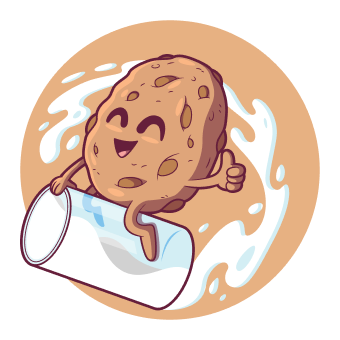Cheers to a Healthier, Happier You
In a world where it seems like everything is getting watered down, people crave the real deal. And when it comes to milk, that definitely includes whole milk. Over the past few years, health-conscious people had been trading out whole milk for lower fat options such as 2% or skim because they’d heard it’s healthier. And while low fat milk is definitely healthy, it’s clear that whole milk is not only healthy, but many milk consumers also really enjoy its texture and taste. It happens to be just as packed with healthy nutrients as low fat. In fact, all types of milk have the same amount of carbohydrates, sugars, calcium, protein and potassium. And the full flavor and texture of whole milk really appeals to kids and athletes as a delicious way of getting those vital nutrients. It’s one of those things that’s not only good for you, but tastes good too!
Healthy = Happy.
Having a balanced diet is key to maintaining a healthy lifestyle. It’s simple; when you eat good, you feel good. There are too many unusual and overrated “health hacks” out there trying to cut corners. Remember, there’s no need to overcomplicate things. Don’t buy that overpriced wellness shot from the snake oil salesmen. Stick to the basics and use the ingredients that nature has already given us—like a good old-fashioned glass of milk!
What Does a Well-Balanced Diet Look Like?
Milk is not only part of a well-balanced diet, but is often called a superfood. A well-balanced diet includes seven essential factors: carbohydrates, protein, fat, fiber, vitamins, minerals, and water. And milk is a nutrient powerhouse that checks a bunch of these boxes and offers more important health benefits besides. One 8 oz cup of milk contains 8 g of protein, 11.4 g of carbohydrates, 7.81 grams of fats, and a variety of healthy vitamins. It is also great for staying hydrated, which is essential to overall health. In fact, it’s like nature’s sports drink, proven to be even more hydrating than water and other manufactured sports drinks. That’s why more and more athletes are choosing milk over water to replenish the electrolytes lost in sweat and to address calcium loss, which can increase the risk of fractures. After a good workout, what could be healthier and more refreshing than a cold, delicious glass of milk!
The nutritional benefits of milk go way beyond what most people imagine. With 13 essential nutrients it’s not just a good source of Calcium and vitamin D. Milk also provides people with vitamins and minerals that have many vital health benefits including supporting the immune system. It’s important to know what vitamins and minerals milk contains. Check out what milk’s got!
- Vitamin A: Important for vision, the immune system, reproduction, and growth/development. It also helps your heart, lungs, and other organs function properly.
- Vitamin B12: It plays a key role in energy and serotonin production, keeping you active and smiling 🙂
- Calcium: Essential for building and maintaining strong bones and teeth. Adequate calcium intake can help prevent osteoporosis and other bone-related diseases.
- Vitamin D: Helps your body absorb calcium, supports immune function, and promotes bone health.
- Protein: High-quality protein in milk supports muscle growth and repair, making it an excellent post-workout recovery drink.
- Potassium: Helps maintain healthy blood pressure and supports heart health.
Milk can be enjoyed on its own or added to a variety of recipes, from smoothies to baked goods; no matter how you incorporate it, milk is here for your benefit. We’re not saying it’s all you need, but it is a convenient one-stop-shop for getting those daily doses.
Maintaining a balanced diet should also include:
Fruits and Vegetables
- Variety is Key: Aim for a colorful plate! Different colors mean different vitamins and minerals, so mix it up with a variety of fruits and veggies.
- Daily Intake: Most people don’t eat enough fruit and vegetables. But according to the CDC people should be eating at least five servings a day. Fresh, frozen, or canned (without added sugars or salts) all work.
Dairy Foods
- Daily Dairy: Adding dairy to your daily routine can be both fun and delicious! Whether it’s creamy yogurt, a slice of your favorite cheese, or a refreshing glass of milk, your bones will thank you. The USDA says anyone over 9 needs 3 cups of dairy a day to keep those bones strong and happy.
Whole Grains
- Nutrient-Rich Choices: Opt for whole grains like brown rice, quinoa, oats, and whole wheat products. They’re loaded with fiber, B vitamins, and essential minerals.
- Benefits: Whole grains support your digestive health, help you maintain a healthy weight, and reduce the risk of heart disease.
Protein Sources
- Diverse Options: Include a variety of proteins such as lean meats, poultry, fish, eggs, legumes, nuts, and seeds. Plant-based proteins are also great for those interested in reducing meat intake.
- Protein Power: Protein is crucial for building and repairing tissues and producing enzymes and hormones. The primary function is to supply the essential components needed for the body’s growth and repair.
Healthy Fats
- Good Fats: Incorporate sources of healthy fats such as avocados, olive oil, nuts, seeds, and fatty fish like salmon. These fats are essential for brain health and reducing inflammation.
- Moderation: Healthy fats are beneficial, but enjoy them in moderation to keep your diet balanced.
Finding the right path to a healthy lifestyle can feel complicated. By incorporating simple nutrient-packed foods like milk into your diet, you can ensure you’re getting a wealth of essential vitamins and minerals in one go. Mix that in with your fruits, veggies, and proteins and you have yourself a balanced diet, fueling you to reach your fullest potential.
So, let’s raise a glass of milk to making smarter, simpler choices. Cheers to a balanced diet and a healthier, happier you!


